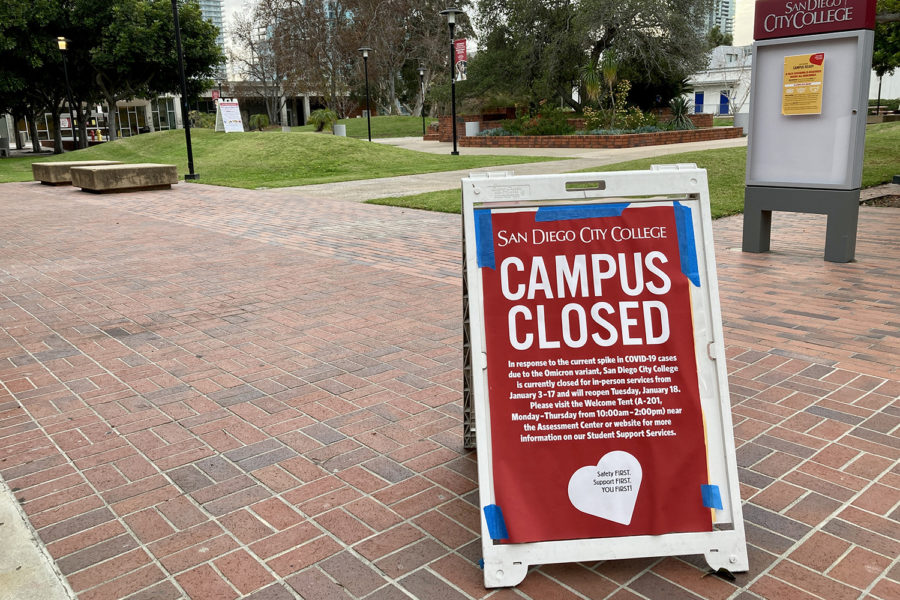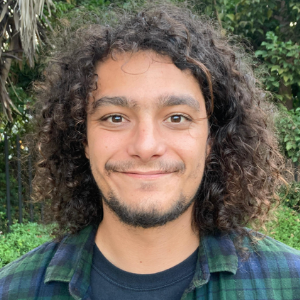City student, faculty among plaintiffs suing SDCCD over COVID-19 requirements
Lawsuit alleges SDCCD’s requirements violate civil rights and amount to religious discrimination
As the Omicron variant of COVID-19 spread throughout the region in January 2022, the San Diego Community College District instituted stricter vaccine requirements and delayed the return to campus for the spring semester. Photo by Kathy Archibald/City Times Media
April 15, 2022
A San Diego City College faculty member and an alum are among a group of employees and students suing three Southern California community college districts alleging the district’s COVID-19 vaccine, testing and masking requirements violated their civil rights.
It’s the latest legal challenge to such requirements to spring up in recent months. And it highlights the concerted, and increasingly organized opposition to the measures, particularly on the political right.
As City Times previously reported, the San Diego Community College District announced it was altering its COVID-19 vaccination requirements in January to limit in-person instruction “primarily to students who have been fully vaccinated.”
The Grossmont-Cuyamaca Community College District, also named in the lawsuit, has similar vaccination policies, while the third district, South Orange Community College District, allows for unvaccinated students to submit to biweekly testing to be eligible for in-person instruction.
The lawsuit argues the districts lacked the authority to institute COVID-19 vaccination, testing or masking requirements.
Additionally, the lawsuit states that because individuals with religious exemptions were required to be tested twice a week the districts had “engaged in discrimination of plaintiffs, on the basis of religion.” It also called the biweekly testing and required masking “coercive.”
“Because of deeply held religious beliefs or medical conditions,” the lawsuit reads, plaintiffs are “unable or unwilling to get the COVID-19 vaccine.”
In a statement emailed to City Times, Jack Beresford, SDCCD’s director of communications and public relations, wrote the district continues to follow federal, state and local public health agencies’ guidelines and requirements.
“The District remains committed to providing safe and healthy classrooms, services, and work spaces,” Beresford wrote, “while respecting the legal rights and personal choices of all students, employees, and community members.”
The lawsuit was filed March 30 by attorney Gary Kreep in the Southern District of California, and is connected to a web of Kreep-affiliated organizations including United for Civil Rights, and the California Constitutional Rights Foundation.
The groups, which themselves are not nonprofits, are soliciting donations that are funneled through an Alexandria, Virginia nonprofit called the Faith and Freedom Foundation.
Kreep played an active role in the anti-Barack Obama birther movement of the late-aughts, and won election to a San Diego Superior Court judgeship in 2012. But in 2018 he was resoundingly defeated for reelection thanks, in part, to a “severe public censure” from California’s judicial watchdog group for a range of misconduct.
When asked by email for an interview, one of the plaintiffs, City student services faculty and SDCCD’s current Acting Director for Admissions and Records Dora Meza responded that she had referred the request to her attorney for review.
But Meza, and another of the plaintiffs – City student Mary Kate Planeta – spoke with San Diego-based far-right news outlet OAN earlier this week.
During the interview, OAN host Dan Ball referred to the COVID-19 pandemic as a “plandemic” and called the vaccine an “experimental shot.” Ball has previously made headlines for his conspiratorial rhetoric surrounding vaccines and the COVID-19 pandemic, like when he said on his show that politicians who endorsed COVID-19 mitigation measures “have a little bit of Hitler in them.”
Planeta, who was granted a religious exemption from SDCCD’s vaccine requirement for the fall 2021 semester, had it revoked when the district changed its policies in January. She said she was then dropped from her in-person classes and that City had not made accommodations for her to take online courses. She estimated this had put her educational plan back a full year.
In the interview, Meza said SDCCD had decided it was “their way or the highway.”
“They imposed the restrictions and notified students and faculty and staff that unless you were vaccinated there would be no place for you within our district, which is completely opposite of the mission of a community college,” Meza said.
But according to documents included in the filing, Meza’s request for a religious exemption to SDCCD’s vaccine requirement was ultimately approved on appeal in Nov. 2021 with the stipulations she wear a mask at all times, test weekly, and seek to maintain social distancing.
Just one month later, according to emails in the filing, Meza contracted COVID-19.













